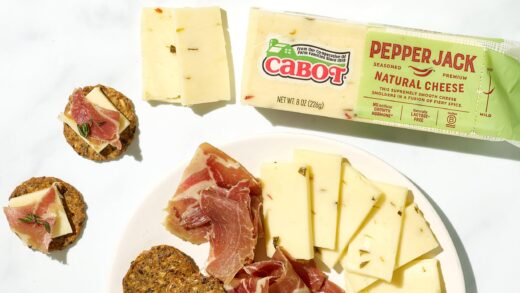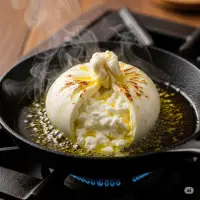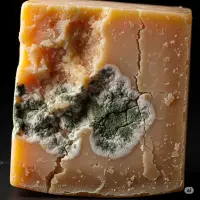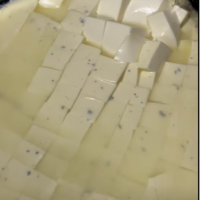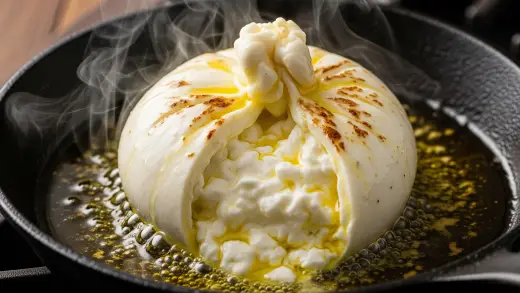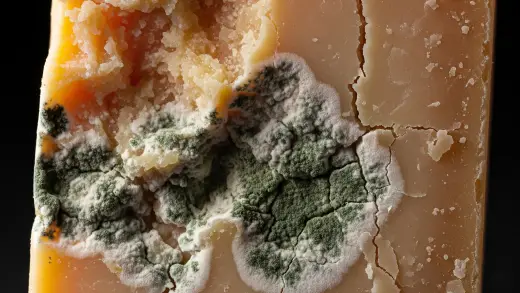Yes, Provolone cheese can have a strong aroma that can be pungent or sour, especially when it is aged or smoked. The provolone is a semi-hard cheese, and its scent is expected from a Provolone.
But a pronounced odor may indicate that the cheese has gone bad and should not be consumed.
Introduction on Does Provolone Cheese Smell
Provolone cheese, from Italy, is a kind of semi-hard cheese that many people love. It comes mainly from cow’s milk and has a special taste and can be used in many ways.
Now, let’s talk about the smell of Provolone cheese. It’s not just about how it tastes; it’s also about how it smells. We want to figure out what makes Provolone cheese smell the way it does.
We’ll look into where it comes from, how it’s made, and the different smells that come together in this special cheese. Come along as we explore the story behind Provolone’s smell, filled with traditions, skills, and the history of this awesome cheese.

Does Provolone Cheese Evoke A Strong Scent?
Provolone cheese, known for its mild and creamy flavor, is often a popular choice for sandwiches, pizzas, and various Italian dishes. But does Provolone cheese evoke a strong scent?
Let’s explore the characteristics of Provolone’s natural smell and the factors that enhance its distinct aroma.
Characteristics Of Provolone’s Natural Smell
Provolone cheese has a strong aroma that can be described as pungent or sour. While some may find its smell appealing, others may consider it too intense.
The distinct aroma of Provolone is attributed to the aging process and the specific bacteria and fungi used during production. As Provolone ages, its smell becomes more pronounced, contributing to its rich and unique flavor profile.
Factors That Enhance Provolone’s Distinct Aroma
Several factors contribute to the enhanced scent of Provolone cheese:
- Aging: The longer Provolone is aged, the stronger its aroma becomes. Aging allows the flavors to develop and intensify, resulting in a more pronounced smell. Typically, aged Provolone has a sharper scent compared to younger varieties.
- Cultures and enzymes: During the cheesemaking process, specific cultures and enzymes are added to Provolone, which contribute to its unique smell. These cultures and enzymes play a crucial role in breaking down proteins and fats, releasing aromatic compounds that create the distinct aroma of Provolone.
- Smoking: Some varieties of Provolone are smoked, adding another layer of complexity to its scent. The smoking process infuses the cheese with smoky flavors and imparts a robust aroma that is loved by many cheese enthusiasts.
- Ripening conditions: The conditions in which Provolone is ripened can also impact its scent. Factors such as temperature, humidity, and airflow influence the development of flavors and aromas. Optimal ripening conditions ensure the full potential of Provolone’s distinct aroma is realized.
So, if you’re wondering whether Provolone cheese evokes a strong scent, the answer is yes. Its pungent and sour aroma is characteristic of this beloved Italian cheese. Whether you enjoy its powerful scent or prefer a milder option, Provolone’s distinct aroma adds depth and flavor to a wide range of dishes.
Understanding Provolone’s Aroma Creation
Provolone cheese can have a strong aroma, with some varieties being pungent or sour. Smoked provolone, in particular, has a distinctive smoky smell. However, if the provolone cheese has a pronounced odor of ammonia or sewage, it is likely spoiled and should not be consumed.
https://youtu.be/sR9HhGQo0tM
The Role Of Aging In Aroma Development
Age plays a significant role in the creation of Provolone cheese’s distinct aroma. As Provolone cheese ages, the flavors and aromas deepen, resulting in a more robust and characterful product.
The aging process allows the cheese to develop intricate compounds that contribute to its unique smell, giving it a desirable and pronounced fragrance.
Influence Of Bacterial Cultures On Fragrance
Bacterial cultures play a crucial role in the creation of Provolone cheese’s fragrance. These cultures, specifically selected strains of bacteria, contribute to the cheese’s aroma by producing enzymes that break down proteins and fats during the fermentation process.
This breakdown leads to the formation of various volatile compounds, which are responsible for the distinctive smell associated with Provolone cheese. The specific strains of bacteria used can have a significant impact on the final aroma profile of the cheese, resulting in different variations of scent among different types of Provolone.
Impact Of Milk Source And Processing
The source of milk and the processing methods employed can also influence the aroma of Provolone cheese. Different milk sources, such as cow, goat, or sheep, can impart unique flavors and smells to the cheese due to variations in milk composition.
Similarly, the processing techniques used, such as heating and fermenting conditions, can affect the aroma development of Provolone cheese. These factors, combined with aging and bacterial cultures, contribute to the diverse range of aroma profiles found in Provolone cheese.
Overall, the creation of Provolone cheese’s aroma is a complex process influenced by aging, bacterial cultures, and milk source and processing. These factors work together to produce a wide range of scents, from mild and subtle to strong and pungent.
Whether you enjoy the distinct smell of Provolone or find it overpowering, understanding the factors behind its aroma creation adds an extra layer of appreciation to this classic cheese.
Unveiling The Mysteries of Provole Cheese Aroma
Provolone cheese is a type of Italian semi-soft cheese that is known for its distinctive aroma and flavor. The aroma of Provolone cheese is influenced by several factors, including its ingredients, production process, and aging conditions.
Let’s explore some of the key factors that contribute to the mysteries of Provolone cheese aroma:
Milk Source:
The type of milk used in cheese production plays a crucial role in determining its aroma. Provole cheese is traditionally made from cow’s milk, but variations may include sheep’s or goat’s milk blends. The quality and composition of the milk can influence the final aroma.
Cheese Cultures:
The specific cultures and starter bacteria used during the cheese-making process contribute to the development of the cheese’s aroma. Different strains of bacteria produce various compounds that influence the flavor and scent of the cheese.
Production Process:
The cheese-making process involves several steps: coagulation, curd cutting, draining, and molding. Each of these steps can affect the texture and aroma of the cheese. For Provolone cheese, the curds are typically kneaded and stretched, giving it a unique texture and enhancing its aromatic profile.
Smoking Process:
In some cases, Provolone cheese is smoked, imparting a distinct smoky aroma to the cheese. The smoking process involves exposing the cheese to wood smoke, and the type of wood used can contribute specific notes to the aroma.
Aging Conditions:
The length and conditions of aging or ripening play a significant role in developing the aroma of Provolone cheese. During aging, the cheese undergoes biochemical changes, forming volatile compounds that contribute to its unique scent.
Microbial Action:
The activity of microorganisms during the fermentation and aging processes can produce various aromatic compounds. Brevibacterium linens, for example, is a common bacteria that contributes to the distinctive aroma of many cheeses.
Storage Environment:
The conditions in which Provolone cheese is stored, including temperature and humidity, can impact its aroma. Proper storage conditions help the cheese mature and develop its desired characteristics.

Differentiating Between Normal Vs. Off Smells
When it comes to the aroma of provolone cheese, there is often confusion about what is considered normal versus off smells.
While provolone cheese does have a distinct scent, it should not have an overpowering or unpleasant odor. Generally, provolone cheese has a strong aroma that is reminiscent of a combination of tangy, earthy, and slightly nutty notes.
However, if the provolone cheese emits a foul or rancid smell, it is a clear indication that the cheese has gone bad and should not be consumed. Signs of spoilage include an ammonia or sewage-like odor. In such cases, it is best to err on the side of caution and discard the cheese to avoid any potential health risks.
Perception Of Provolone Smell Among Varied Individuals
The perception of the smell of provolone cheese can vary among individuals. Some people may find the aroma enjoyable and appetizing, while others may perceive it as strong or pungent. Factors such as personal taste preferences, cultural backgrounds, and olfactory sensitivity can influence how individuals interpret the scent of provolone cheese.
It’s important to note that what one person finds appealing, another person may find off-putting. Therefore, the aroma of provolone cheese can be subjective, and it is essential to respect and acknowledge individual differences in olfactory perception.
Descriptors For The Authentic Provolone Scent
Describing the smell of authentic provolone cheese can be challenging but not impossible. The authentic provolone scent can be characterized as complex, robust, and distinctive. It combines a blend of tanginess, earthiness, and a hint of nuttiness. These aromatic profiles contribute to the rich and intense flavor that provolone cheese is known for.
Authentic provolone cheese should not have an overpowering or repulsive smell. Any signs of an overly unpleasant or rancid odor may indicate spoilage or poor quality. To ensure a genuine provolone experience, look for provolone cheese that exhibits the characteristic aroma described above.
Is It Just Provolone Or Spoilage?
Provolone cheese can have a distinct odor, which can be pungent or sour, depending on the type. While some U. S made provolones may have a strong scent resembling vomit, authentic provolone cheese has a strong scent that correlates with its strong flavor.
However, if the provolone cheese smells of ammonia or sewage, it indicates spoilage and should not be consumed.
Identifying Signs Of Spoilage In Provolone
Provolone cheese is known for its distinct aroma, but how do you differentiate between its inherent smell and spoiled cheese? It’s important to be able to identify signs of spoilage in Provolone cheese to ensure you’re consuming it safely.
A pronounced odor will indicate that the cheese has gone bad and should not be consumed. If the Provolone smells of ammonia or sewage or has a rancid smell, it’s a clear sign of spoilage. Additionally, any visible mold growth on the cheese is a definite indicator that it is no longer safe to eat.
It is crucial to note that Provolone cheese can develop off-aromas as it ages, which are different from signs of spoilage. These off-aromas can include a tangy, sharp, or slightly pungent smell. While these smells may be strong, they are a natural part of the aging process and are not indicative of spoilage.
How Off-aromas Differ From Provolone’s Inherent Smell
Provolone cheese has a distinct inherent smell that can be described as sour, ripe, and strong. This aroma is a characteristic of Provolone and is expected in most varieties.
However, it’s important to differentiate between this natural smell and off-aromas that may develop during the aging process.
Off-aromas in Provolone cheese can range from tangy to sharp, and even slightly pungent. These smells are developed as the cheese ages, and they contribute to its flavor profile.
While they may be strong, these off-aromas are not signs of spoilage and are considered desirable by those who enjoy Provolone cheese.
Tips On Safe Consumption Based On Aroma Cues
When consuming Provolone cheese, it is important to pay attention to its aroma cues to ensure safe consumption. Here are a few tips:
- If the Provolone cheese has a strong odor of ammonia, sewage, or a rancid smell, it should not be consumed. These are signs of spoilage, and the cheese may not be safe to eat.
- Visible mold growth on the Provolone cheese is a clear indication that it has spoiled and should be discarded.
- On the other hand, if the Provolone cheese has off-aromas such as tangy, sharp, or slightly pungent smells, these are a natural part of aging and are not signs of spoilage. You can still enjoy the cheese if it has these aromas.
- It’s always recommended to check the expiration date and storage guidelines on the Provolone cheese packaging to ensure its freshness and safe consumption.
- If you’re unsure about the smell or appearance of the Provolone cheese, it’s best to err on the side of caution and discard it to prevent the risk of foodborne illnesses.
Tackling Provolone’s Pungent Presence
Provolone cheese is known for its robust flavor and pungent aroma, which can be both enticing and overwhelming for different individuals. Whether you love the distinct smell of Provolone or find it off-putting, there are ways to mitigate its strong presence when cooking with it. In this section, we will explore techniques to lessen Provolone’s powerful smell, options for pairing it with complementary flavors, and storage practices to maintain its optimal aroma.
Mitigating The Strong Smell Of Provolone In Cooking
When using Provolone cheese in cooking, there are techniques you can employ to lessen its strong smell and create a more balanced dish. Here are some tips:
- Consider using a milder variety of Provolone if you find the smell overpowering.
- Grate or shred the Provolone cheese before adding it to your dish. This allows it to melt more evenly and reduces the concentration of its aroma.
- Combine Provolone with other cheeses to create a more complex flavor profile. Mixing it with milder cheeses like mozzarella or fontina can help temper its strong smell.
- Cook Provolone at lower temperatures to avoid releasing too much of its aroma. Slow cooking methods, such as baking or simmering, can help mellow its scent.
Pairing Options To Complement Provolone’s Powerful Aroma
Provolone’s strong aroma pairs well with certain flavors that can enhance the overall taste experience. Here are some options to consider:
- Sharp, acidic ingredients like pickled vegetables or olives can cut through Provolone’s richness and balance its pungency.
- Spicy ingredients like hot peppers or chili powder can add a contrasting kick to the dish and complement the strong flavors of Provolone.
- Herbs and spices such as oregano, basil, or thyme can enhance the savory notes of Provolone and create a harmonious flavor profile.
- Pair Provolone with ingredients that have a sweet or fruity flavor, like caramelized onions or fig jam, to create a delicious contrast.
Storage Practices To Maintain Provolone’s Optimal Aroma
Proper storage is crucial to preserve the aroma and taste of Provolone cheese. Follow these practices to ensure your Provolone stays fresh:
- Wrap Provolone tightly in wax paper or plastic wrap to protect it from air and moisture.
- Store Provolone in the refrigerator at a temperature of around 40°F (4°C).
- Avoid storing Provolone near strongly scented foods, as it can absorb odors.
- Use Provolone within a week of opening to enjoy it at its best.
By following these tips, you can enjoy the unique flavor and aroma of Provolone cheese while managing its pungent presence in your cooking. Experiment with different combinations and cooking methods to find the perfect balance that suits your taste buds.

Credit: pinterest.com
Frequently Asked Questions of Does Provolone Cheese Smell?
Is Provolone Cheese Tasteless?
Provolone cheese is not tasteless, but it has a distinct flavor that some may find strong. It can have a pungent or sour aroma, especially when it ages. The taste is creamy, bright, and not too salty.
It is important to note that a strong or rancid odor may indicate that the cheese has gone bad and should not be consumed.
What Does Rancid Cheese Taste Like?
Rancid cheese has a taste that is unpleasant and not like cheese at all. It can cause tingling or burning sensations in your mouth. Sometimes, the cheese may smell fine but taste bad, or vice versa. Check the expiration date to determine if it is safe to eat.
What Other Cheese Does Provolone Taste Like?
Provolone cheese has a distinct aroma, which can be pungent and sour. Its taste is creamy, bright, and not too salty, with small, crystallized bits. The flavor becomes stronger with age and texture. It is not supposed to taste like vomit, and a strong, unpleasant smell may indicate spoilage.
Does Provolone Cheese Have A Smell?
Provolone cheese does have a distinct smell, which can range from mild to strong depending on the variety. The smell is often described as pungent, sour, or smoky.
Does Provolone cheese have a strong smell?
Yes, Provolone cheese is known for its distinct and robust aroma, which intensifies with age.
What causes the smell in Provolone cheese?
The smell in Provolone cheese comes from the combination of bacteria, molds, and enzymes used during the fermentation and aging processes.
Does the smell of Provolone vary based on its age?
Absolutely, the aroma of Provolone changes as it ages. Younger Provolone tends to have a milder smell, while aged varieties develop a more pronounced and complex scent.
Are there different types of Provolone with varied smells?
Yes, there are different types of Provolone, and the smell can vary based on factors such as the region of production, aging time, and specific production techniques.
Can the smell of Provolone cheese be overpowering?
For individuals sensitive to strong cheese aromas, the smell of Provolone, especially in aged varieties, can be quite potent.
Can the smell of Provolone cheese be an indicator of its quality?
Yes, the aroma of Provolone is often considered an important aspect of its overall quality. A well-made Provolone will have a rich and inviting smell.
Are there ways to reduce the smell of Provolone in dishes?
To mellow the smell, consider using milder Provolone varieties in recipes or mixing it with other cheeses to balance the flavors.
Does cooking with Provolone affect its smell?
Cooking with Provolone can enhance its aroma, as the heat releases and intensifies the cheese’s flavors and scents.
Can I expect Provolone to smell similar to other cheeses?
While Provolone has its unique smell, it shares some common aromatic elements with other aged and semi-hard cheeses.
Are there Provolone alternatives with milder smells?
Yes, if you find Provolone’s smell too strong, you might opt for younger or milder Provolone varieties, or explore other semi-hard cheeses with gentler aromas.
Conclusion
So, we’ve taken a good look at what makes Provolone cheese smell the way it does. From its history to how it’s made, Provolone’s smell is like a story that unfolds in every bite.
Now, it’s your turn! Give Provolone’s smell a chance. Dive into its bold and rich scents with curiosity. Don’t shy away—embrace the unique smells that make Provolone special.
Cheese smells are like a fun adventure for your senses. Provolone adds its own chapter to this adventure.
Whether you enjoy it by itself or mix it into your favorite dishes, Provolone’s smell is a reminder that there’s more to discover beyond just looking at these tasty creations.


